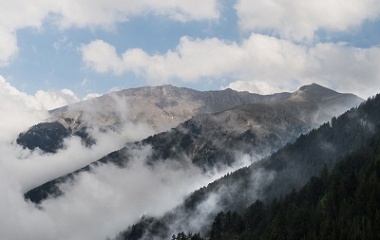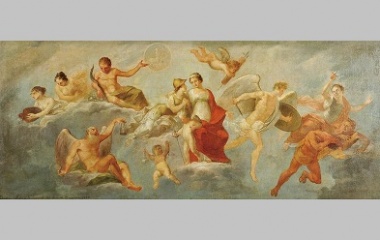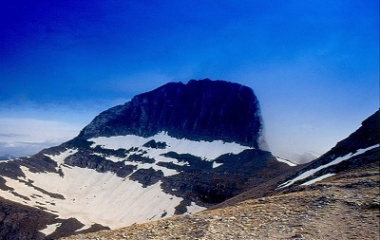A mist-shrouded mountain, reaching up to the sky, was home to ancient gods who looked down upon the Earth each day to decide on the fate of humanity.
What Is Mount Olympus?
Mount Olympus is the mythical home of the gods in Greek mythology. According to authors, the mountain was created after the Titanomachy, the epic battle between the young gods, the Olympians and the older gods, the Titans. As a result of this battle, the Olympian victors created their new majestic home – Mount Olympus. It was shrouded from human eyes by clouds which constantly obscured its peaks. In Greece, you will also find a Mount Olympus, the tallest mountain in the country.
Description
The sacred mount was believed to have a temperate climate all year round, and mountain gorges lush with forests. The gods did not always reside in their paradise, however, and would depart or return from there via a gate of clouds guarded by the Horae, the goddesses of the seasons. Authors claim the tables in Zeus’ palace on Olympus were made of gold and were actually automatons, created by Hephaestus! They moved in and out of the rooms as required by the gods. Zeus’ throne was situated in the Pantheon, the meeting hall of the gods. It was also designed by Hephaestus and was constructed from black marble, inlaid with gold. Each of the gods had their own palace on the mountain, usually constructed of gold and marble, and situated in a gorge in the mountain peaks.
Inhabitants
All 12 Olympian gods resided at Mount Olympus: Zeus and his wife Hera, Athena, Poseidon, Artemis, Apollo, Demeter, Hester, Aphrodite, Hermes, Hephaestus and Ares. Since Hades resided in the underworld, he was not considered an Olympian god and did not visit the great mount often.
The nine muses, the daughters of Mnemosyne and Zeus, resided at the foot of the mountain. According to some sources, the goddesses were water nymphs and were responsible for the following: Clio – history; Calliope – epic poetry; Thalia – comedy; Euterpe – lyric poetry; Terpsichore – dance; Melpomene – tragedy; Erato – love poetry; Urania – astronomy; and Polyhymnia – sacred poetry.
The Olympians ruled Olympus until the monster Typhon attacked their stronghold. Typhon was allegedly a 100-headed fire-breathing dragon. When he attacked Olympus, the majority of the gods chose to flee, except for Zeus, Athena and Dionysus. Zeus was able to eventually defeat the giant monster with 100 lightning bolts, and banished him to Tartarus.
Activities
The gods met daily at Zeus’ palace in the Pantheon, where they held feasts and discussed the fate of the mortals. There, they drank nectar and ate ambrosia, which perpetuated their immortality. Allegedly, when the gods drank ambrosia, the blood in their veins was replaced by ichor, a substance toxic to humans. Ichor also ran through the veins of Talos, the Greek giant automaton.
Bellerophon
No human could ever come near Mount Olympus, yet authors relay the story of Bellerophon, the son of Eurynome and Poseidon, who tried to reach the top of the mountain! One day he captured Pegasus when the horse was about to drink from a fountain in his town.
Bellerophon was later exiled from his home town and supposed to be put to death, but he was given a second chance. Instead, he had to conquer a Chimera, a fire-breathing monster! He managed to kill the beast by driving a spear with a lead tip into the monster’s throat. After winning at two further tough challenges, he was finally recognized as the son of a god, but Bellerophon wanted more! He decided to fly Pegasus up to Mount Olympus, the home of the gods! Zeus was furious at his actions and sent a vicious fly to bite Pegasus. The fly did as required, causing the horse to throw its rider from its back, sending Bellerophon tumbling back to Earth.
Modern References
Today, a group called the Return of the Hellenes hope to revive ancient Greek religion and mythology. They gather at the foot of Mount Olympus in Greece to celebrate the hero Prometheus, through the Prometheus Festival. The celebrations commence with runners, in full ancient battle gear, wielding shields and spears, running up the sacred mount! The group purportedly revere the 12 Olympian gods and try to live by the same values the gods represented. Followers even decorate their homes with ancient furniture and give their children ancient Greek surnames.
Mount Olympus today is located in the Olympus range, between Macedonia and Thessaly. The area is also a National Park. Historians discovered an ancient Macedonian city called Dion, at the foot of the mountain which was believed to have existed between the 5th century BC and 5th century AD. Some authors claim the village had luxurious mosaicked houses, theatres and sanctuaries dedicated to the gods where sacrificial offerings were made. They held athletic competitions there too, according to some sources.
Ancient civilizations have often tried to understand the divine and mythical through anthropomorphism and personification. Inspired by the mysterious peaks reaching up beyond the clouds, the ancient Greeks understandably believed their sacred Mount Olympus to be the wondrous home of their gods!











Cool article it is very informing.
I agree Ally. I had a good time reasding it.